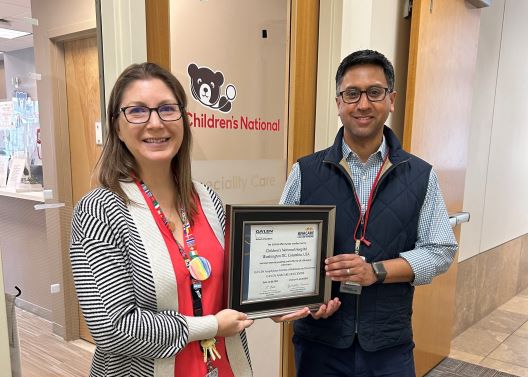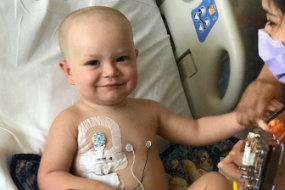
Allergy and Immunology

Our Providers
Our pediatric specialists provide personalized care for your child’s physical, mental and emotional health needs.
Contact Information
To find out more information about the department, call 202-476-3016. For urgent assistance outside of business hours, please call 202-476-5000.
Conditions Treated
Understanding your child's condition is an important step on your treatment journey. Learn more about causes, symptoms and diagnosis for a variety of conditions, as well as unique treatments and research being performed at Children's National.
Our allergy and immunology teams work together because the ways in which these conditions impact the body’s systems are similar. Our immunology team is a national leader in treating and managing primary immunodeficiencies in infants, children, adolescents, and young adults.
The team sees more than 1,500 children and teens annually with allergic disorders, including asthma, agammaglobulinemia (immunodeficiency), eczema atopic dermatitis, and hives. The team has expertise in food allergies, including IgE-mediated food allergy, gastrointestinal food allergy, and eosinophilic gastrointestinal disorders.
Food allergies are a growing public health problem and affect up to 8 percent of U.S. children, says Linda Herbert, PhD, director of the Psychosocial Clinical Program at Children's National. Children can be allergic to a wide range of foods and exposure to just a small amount of a food allergen can be life-threatening. Click through our quick quiz to learn strategies parents can use to help tamp down their teen’s anxieties about food.

Telehealth Appointments
Your child's appointment may be available as a telehealth visit. Please call the Bear Line at 1-888-884-BEAR (2327) to schedule and learn more.
Peanut Patch Treatment Study (VITESSE)
Children's National Hospital is conducting a new study for treatment of peanut allergy. The VITESSE trial seeks to evaluate the safety and effectiveness of an investigational peanut patch treatment designed to potentially reduce the severity of the body's allergic response to peanuts.
Who May Qualify?
- Children ages 4-7 years
- Have a physician diagnosed peanut allergy
- Are in good physical condition and do not have an unstable medical condition or chronic disease

New Hope for Children and Families Coping with Food Allergies
Each day, thousands of children across the country cope with food allergies, many of which can be life-threatening. Meet Miles Monroe, Damiyah and Destiny Brown, kids living with food allergies and their parents as well. Learn from providers at Children's National Hospital about the hope they have for reducing food allergies through research.


Expanded Locations
Our Allergy and Immunology services have been expanded to a new location in Friendship Heights, 5028 Wisconsin Ave NW, Washington D.C. The same care team will be available at both the main hospital and the Friendship Heights location.
- Allergy clinics at the main hospital and Children's National Montgomery County will continue to operate.
- Oral Food Challenges now take place at the main hospital on the first floor. This will ensure maximal patient safety during food challenge procedures.
Locations
This is a carousel. Use Next and Previous buttons to navigate.
Conditions We Treat
Understanding your child's condition is an important step on your treatment journey. Learn more about causes, symptoms and diagnosis for a variety of conditions, as well as unique treatments and research being performed at Children's National.

Online Appointment Scheduling Available for Existing Patients
If your child is an existing patient, you can schedule their appointments online through the MyChildrensNational patient portal. Learn more information about the patient portal and how to sign up.

Rise and Shine Food Allergy Resources
Read our resources to help your family understand and manage your child's food allergies. These resources offer tips for supporting your child with sensitivity to foods daily, in school and during holidays such as Halloween.
Epinephrine Explained
Amanda Troger, a certified pediatric nurse in the Division of Allergy and Immunology, discusses the medication used to treat allergic reactions.


ANACARE Certified
ANACARE is an international network of food allergy centers which now includes Children's National. In order to become an ANACARE center, you have to apply and demonstrate excellence across clinical care, research, education and advocacy. Right now there are 29 centers across 12 countries on three continents.

Family Resources
Resource
Palforzia Treatment
Take a look at our flow chart to see the steps in your child treatment with Palforzia.
Resource
Food Allergy Facts
Learn facts about different types of food allergies from our downloadable brochures.













